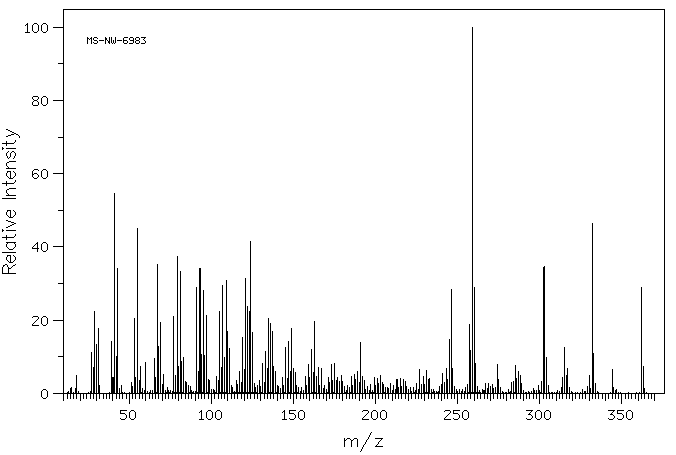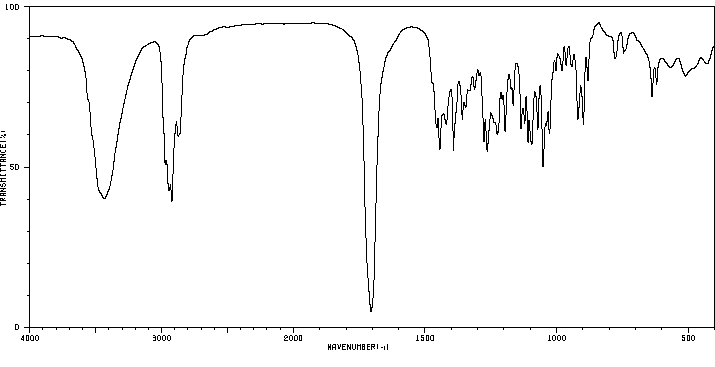5-Alpha-二氢可的松 | 1482-51-5
分子结构分类
中文名称
5-Alpha-二氢可的松
中文别名
4,5-Α-二氫皮甾醇;4,5-Α-二氫可體醇
英文名称
17,21-dihydroxy-5α-pregnane-3,11,20-trione
英文别名
5α-dihydrocortisone;17,21-Dihydroxy-5α-pregnan-3,11,20-trion;17.21.Dihydroxy-5α-pregnantrion-(3.11.20);4,5alpha-Dihydrocortisone;(5S,8S,9S,10S,13S,14S,17R)-17-hydroxy-17-(2-hydroxyacetyl)-10,13-dimethyl-1,2,4,5,6,7,8,9,12,14,15,16-dodecahydrocyclopenta[a]phenanthrene-3,11-dione
CAS
1482-51-5
化学式
C21H30O5
mdl
——
分子量
362.466
InChiKey
YCLWEYIBFOLMEM-FZPGBCFJSA-N
BEILSTEIN
——
EINECS
——
-
物化性质
-
计算性质
-
ADMET
-
安全信息
-
SDS
-
制备方法与用途
-
上下游信息
-
文献信息
-
表征谱图
-
同类化合物
-
相关功能分类
-
相关结构分类
计算性质
-
辛醇/水分配系数(LogP):1.8
-
重原子数:26
-
可旋转键数:2
-
环数:4.0
-
sp3杂化的碳原子比例:0.86
-
拓扑面积:91.7
-
氢给体数:2
-
氢受体数:5
SDS
上下游信息
-
上游原料
中文名称 英文名称 CAS号 化学式 分子量 [2-(17-羟基-10,13-二甲基-3,11-二氧代-1,2,4,5,6,7,8,9,12,14,15,16-十二氢环戊烯并[a]菲-17-基)-2-氧代乙基]乙酸酯 21-acetoxy-17-hydroxy-5α-pregnane-3,11,20-trione 3751-02-8 C23H32O6 404.503 可的松 Cortisone 53-06-5 C21H28O5 360.45 -
下游产品
中文名称 英文名称 CAS号 化学式 分子量 11-Beta,17-alpha,21-三羟基-5-alpha-孕烯-3,20-二酮 11β,17α,21-trihydroxy-5α-pregnane-3,20-dione 516-41-6 C21H32O5 364.482
反应信息
-
作为反应物:描述:5-Alpha-二氢可的松 在 吡啶 、 乙醚 、 二氯甲烷 、 氢溴酸 、 溴 、 乙酸酐 、 对甲苯磺酸 、 溶剂黄146 作用下, 生成 21-acetoxy-20,20-ethanediyldioxy-4α-bromo-17-hydroxy-5α-pregnane-3,11-dione参考文献:名称:Evans et al., Journal of the Chemical Society, 1958, p. 1529,1536摘要:DOI:
-
作为产物:参考文献:名称:Biotransformation of corticosteroids by Penicillium decumbens ATCC 10436摘要:The biotransformation of a series of corticosteroids by the fungus Penicillium decumbens ATCC 10436 has been investigated. Conversion to the corresponding 5 alpha-dihydrosteroid was observed for all the Delta(4)-3-ketosteroids studied with the exception of deoxycorticosterone, which was converted to a Delta(1,4)-diene. Deoxycorticosterone acetate was, however, converted to a 5 alpha-dihydro product concomitant with ester hydrolysis. Other substrates carrying a C-21 acetoxy group were also hydrolyzed to the alcohol. In two cases (resulting from deoxycorticosterone acetate and 11-deoxycortisone) the 5 alpha-3-keto product was further reduced to the 3 beta-alcohol. No reduction of Delta(1,4)-dienes was observed.DOI:10.1016/0039-128x(95)00071-w
文献信息
-
[EN] METHODS FOR STEREOSELECTIVE REDUCTION<br/>[FR] PROCÉDÉS DE RÉDUCTION STÉRÉOSÉLECTIVE申请人:INFINITY PHARMACEUTICALS INC公开号:WO2009086451A1公开(公告)日:2009-07-09The invention is directed to a method to reduce a C-C double bond of an enone of a steroidal compound to produce a mixture of β ketone product and α ketone product, comprising treating a solution or suspension of the steroidal compound in a solvent with hydrogen gas in the presence of a catalyst and a substituted pyridine.
-
USE OF EQUOL FOR TREATING SKIN DISEASES申请人:Lephart Edwin Douglas公开号:US20100076071A1公开(公告)日:2010-03-25Equol (7-hydroxy-3(4′hydroxyphenyl)-chroman), the major metabolite of the phytoestrogen daidzein, specifically binds and blocks the hormonal action of 5α-dihydrotestosterone (DHT) in vitro and in vivo. Equol can bind circulating free DHT and sequester it from the androgen receptor, thus altering growth and physiological hormone responses that are regulated by androgens. These data suggest a novel model to explain equol's biological properties. The significance of equol's ability to specifically bind and sequester DHT from the androgen receptor have important ramifications in health and disease and may indicate a broad and important usage for equol in the treatment and prevention of androgen-mediated pathologies of skin and hair. Thus, equol can specifically bind DHT and prevent DHT's biological actions in physiological and pathophysiological processes affecting skin and hair.
-
Use of equol for treating skin diseases申请人:Brigham Young University公开号:EP2305272A1公开(公告)日:2011-04-06Equol (7-hydroxy-3(4'hydroxyphenyl)-chroman), the major metabolite of the phytoestrogen daidzein, specifically binds and blocks the hormonal action of 5adihydrotestosterone (DHT) in vitro and in vivo. Equol can bind circulating free DHT and sequester it from the androgen receptor, thus altering growth and physiological hormone responses that are regulated by androgens. These data suggest a novel model to explain equol's biological properties. The significance of equol's ability to specifically bind and sequester DHT from the androgen receptor have important ramifications in health and disease and may indicate a broad and important usage for equol in the treatment and prevention of androgen-mediated pathologies of skin and hair. Thus, equol can specifically bind DHT and prevent DHT's biological actions in physiological and pathophysiological processes affecting skin and hair.Equol(7-羟基-3(4'羟基苯基)-色满)是植物雌激素黛泽素的主要代谢产物,在体外和体内能特异性地结合并阻断 5-二氢睾酮(DHT)的荷尔蒙作用。Equol能与循环中的游离DHT结合,并将其从雄激素受体中分离出来,从而改变受雄激素调节的生长和生理激素反应。这些数据为解释 Equol 的生物特性提供了一个新的模型。马郁兰能够特异性地与雄激素受体结合并从雄激素受体中螯合 DHT,这在健康和疾病方面具有重要意义,可能预示着马郁兰在治疗和预防雄激素介导的皮肤和毛发病变方面具有广泛而重要的用途。因此,在影响皮肤和头发的生理和病理生理过程中,马郁兰可以特异性地结合 DHT 并阻止 DHT 的生物作用。
-
Action of Some Steroids on the Central Nervous System of the Mouse. I. Synthetic Methods作者:J. D. Cocker、J. Elks、P. J. May、F. A. Nice、G. H. Phillipps、W. F. WallDOI:10.1021/jm00328a003日期:1965.7
-
Steroids. LXXXVI.<sup>1</sup> Synthesis of Monofunctional 11-Ketones作者:FRANZ SONDHEIMER、E. BATRES、G. ROSENKRANZDOI:10.1021/jo01360a026日期:1957.9
表征谱图
-
氢谱1HNMR
-
质谱MS
-
碳谱13CNMR
-
红外IR
-
拉曼Raman
-
峰位数据
-
峰位匹配
-
表征信息
同类化合物
(5β)-17,20:20,21-双[亚甲基双(氧基)]孕烷-3-酮
(5α)-2′H-雄甾-2-烯并[3,2-c]吡唑-17-酮
(3β,20S)-4,4,20-三甲基-21-[[[三(异丙基)甲硅烷基]氧基]-孕烷-5-烯-3-醇-d6
(25S)-δ7-大发酸
(20R)-孕烯-4-烯-3,17,20-三醇
(11β,17β)-11-[4-({5-[(4,4,5,5,5-五氟戊基)磺酰基]戊基}氧基)苯基]雌二醇-1,3,5(10)-三烯-3,17-二醇
齐墩果酸衍生物1
黄麻属甙
黄芪皂苷III
黄芪皂苷 II
黄芪甲苷 IV
黄芪甲苷
黄肉楠碱
黄果茄甾醇
黄杨醇碱E
黄姜A
黄夹苷B
黄夹苷
黄夹次甙乙
黄夹次甙乙
黄夹次甙丙
黄体酮环20-(乙烯缩醛)
黄体酮杂质EPL
黄体酮杂质1
黄体酮杂质
黄体酮杂质
黄体酮EP杂质M
黄体酮EP杂质G(RRT≈2.53)
黄体酮EP杂质F
黄体酮6-半琥珀酸酯
黄体酮 17alpha-氢过氧化物
黄体酮 11-半琥珀酸酯
黄体酮
麦角甾醇葡萄糖苷
麦角甾醇氢琥珀酸盐
麦角甾烷-6-酮,2,3-环氧-22,23-二羟基-,(2b,3b,5a,22R,23R,24S)-(9CI)
麦角甾烷-3,6,8,15,16-五唑,28-[[2-O-(2,4-二-O-甲基-b-D-吡喃木糖基)-a-L-呋喃阿拉伯糖基]氧代]-,(3b,5a,6a,15b,16b,24x)-(9CI)
麦角甾烷-26-酸,5,6:24,25-二环氧-14,17,22-三羟基-1-羰基-,d-内酯,(5b,6b,14b,17a,22R,24S,25S)-(9CI)
麦角甾-8-烯-3-醇
麦角甾-8,24(28)-二烯-26-酸,7-羟基-4-甲基-3,11-二羰基-,(4a,5a,7b,25S)-
麦角甾-7,22-二烯-3-酮
麦角甾-7,22-二烯-17-醇-3-酮
麦角甾-5,24-二烯-26-酸,3-(b-D-吡喃葡萄糖氧基)-1,22,27-三羟基-,d-内酯,(1a,3b,22R)-
麦角甾-5,22,25-三烯-3-醇
麦角甾-4,6,8(14),22-四烯-3-酮
麦角甾-1,4-二烯-3-酮,7,24-二(乙酰氧基)-17,22-环氧-16,25-二羟基-,(7a,16b,22R)-(9CI)
麦角固醇
麦冬皂苷D
麦冬皂苷D
麦冬皂苷 B








